Today, things on my mind with this project....
Investigation of the concepts of aggression
Rather then repeating the assumptions that exist of it
as a thing itself. Which can be done. and which will be a part of our research: to learn what these are...
but rather then working to simply seek out 'understanding' -- as if "aggression" is simply a thing to debate and to understand...
I wonder:
What happens if we create a space to reflect on the very concept of it, itself?
How did this concept arise?
Where it is rooted in? Social Darwinism?
Is it a positivist idea (by "positivist" I mean works from and creates an imagination that isolates the 'human' subject from the cultural/political structure).
This then leads to questions of what we mean by "aggression"?
Is it always about a 'foreign' body? Like in: "an aggressive form of cancer".
When is it a good thing? Only in arenas of competition? Like in: "Football player Sean O'Day displayed an aggressive command of the field today", or "He's very a very aggressive player". (also this suggests issues of gender around "aggression")
Because, I am wondering:
perhaps this concept -- the current way of isolating it out, as a thing that simply stands alone, from other relations -- creates in a way, a strange sort of imagination and fantasy structure about how 'aggression' should work? It assumes normalcy.
Perhaps it has implicit in it, certain ideas of what being-normal is?
I.e. a competitive male individual who is transparent and free, who is above history, politics, weird conflicts. Who is perfectly rational. But in a certain way.




























